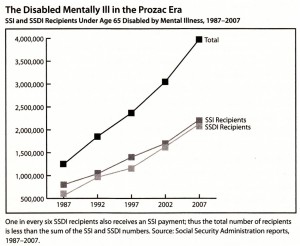
This piece examines the gun control debate in response to the Janus Forum ongoing Miniseries On Guns in America. The Series’ final installment, “Mental Health,” takes place Tuesday, April 9 at 4pm.
Mental health seems to be the one point, and only one point, that liberals and the NRA agree upon when it comes to gun control—but one side is clearly getting the better of the other.
Let’s assume the consensus on mental health is pretty much set in stone. “Metal health outreach and screening” might have made the Aurora shooters’ fail a background check, writes Craig R. Whitney, a former New York Times editor and author of “Living with Guns: A Liberal’s Case for the Second Amendment.” A renewed focus on mental health and civil commitments was the only agreement between the NRA’s Chris Cox and Senator Blumenthal. In his announcement to introduce gun control legislation, Harry Reid assured reporters that the bill would include a “mental health provision,” without elaboration. Reid seemed to be responding to one of Wayne LaPierre’s favorite talking points: “We have a mental health system in this country that has completely and totally collapsed,” LaPierre said in an interview with NBC. “We have no national database of these lunatics.”
These lunatics. I empathize with the pro-gun control contingent’s stampede toward any glint of compromise from the NRA, but stop and think about what LaPierre is saying: his clear misunderstanding of what the mental health system is supposed to do, rehabilitate and not blacklist; the glibness of demonizing an underclass of Americans who already remain badly stigmatized; or, if nothing else, the tone-deafness of a spokesman for an industry whose main product was recently used to dismember children, ostensibly now having appointed himself grand inquisitor in the new Hunt for Lunatics. After all, only 5% of violent crime is committed by the mentally ill. Nearly 70% of murders are committed by the mentally healthy using Wayne’s weapons.
But the most unnerving point is the one that LaPierre actually gets right: our mental health system is deeply flawed. In a twist that should surprise no one, the actual flaws of the system represent exactly the opposite ones that might have lent LaPierre’s argument any validity.
Namely, one of the most under-reported crises in American mental heath systems is the widespread over-diagnosis of mental illness. This year, the American Psychiatric Association will publish the fifth edition of the Diagnostic and Statistical Manual of Mental Disorders (DSM), the bible of mental health diagnosis. The DSM encapsulates the arrival of a private pharmaceutical behemoth with a profit motive that makes Trump Tower look like a kibbutz. We often assume the principle task of medical innovators is to discover new cures. In the case of mental health and the DSM, however, it may be more profitable to discover new illnesses.
Dr. Allen Frances recently has presented a similar argument, postulating that the real explanation for the rise in mental health diagnoses reflects a downward spiral of a political-medical complex and a profit motive gone haywire. Why not broaden the definition of mental illness when your industry has a monopoly on “curing” it? Using the AMA’s notoriously murky diagnostic guidelines, over half of the American population qualifies as mentally diseased during some point in their lives. Over 25% would qualify right now. If that strikes you as suspicious, Frances thinks you’re right (see video below). A few of the DSM’s new “disorders”:
Disruptive Mood Dysregulation Disorder (for “temper tantrums”)
Major Depressive Disorder (for “normal grief”)
Minor Neurocognitive Disorder (for “everyday forgetting” in old age)
Generalized Anxiety Disorder (for “everyday worries”)
“The rates of mental illness would seem to be climbing at alarming proportions,” says Frances. But “only a small portion” of this increase can actually account for medical and cultural improvements in recognizing the authentic signs of mental illness. “It’s very easy to change the definition of a mental disorder,” says Frances. “All of a sudden you can have millions of new patients,” largely by altering the text of the DSM. “You can invent ten million patients overnight.” The widespread debate over ADHD, for instance, represents the most visible layer of this debate. But it is also related to the conversation surrounding guns.
For the right, the fierce desire to lock up the “lunatics” presents an embarrassing contradiction. Think about it. The NRA believes that the government’s only motivation for implementing background checks is the tyrannical confiscation of everyone’s guns. But if I’m a scheming, tyrannical government, wouldn’t a far easier ploy to confiscate guns be to create a mental health requirement for firearms? Why waste political capital on background checks legislation, which has a far lower chance of passage, when you can achieve the same tyrannical step toward confiscation through the far-more-popular mental health barricade? ADHD, OCD, or any other form of neurosis would bar gun ownership, and the 50% of the population that suffers mental health issues in their lifetime could then conceivably become gun-less. Not that the NRA polemics were ever of serious consideration, but it serves as a good reminder that even venturing down their bizarre rabbit-hole of alternative reality, truly nothing holds up. Yet the NRA is promoting the mental health requirement as a magnanimous concession.
The answer why, of course, is that background checks now bite into profit margins in a way that mental health requirements later do not—that is, the NRA is willing to “lose” the business of mental health patients, because there is no business coming from mental health patients. Mental health patients are not violent, despite the enduring stereotypes of Americans.
And that’s where the right is meep-meeping the left on mental health. The liberal position ought to advocate for a mental health system that treats patients with dignity and, just like the medical field at large, remains devoted to making people’s lives better. That means taking small steps to realign the pharmaceuticals profit motive, taking a holistic and community-oriented approach to healing, and most importantly, creating and sustaining a national dialogue that reflects our commitment to normalizing mental illness relative to other illnesses.
Instead, the political left is largely entertaining LaPierre’s “lunatics” argument. Absent a voice of reason, our national approach for mental health now resembles a conversation that begins with “Keep these lunatics away from guns” and ends with “Let’s put them in a registry.” Is there any reason to believe that such a conversation serves our long-term needs to engender a more sensible mentality toward mental health—let alone the needs of the patients themselves?
The political left is betting away a chance to serve as that voice of reason, and setting back our national conversation on mental health as a result. All this for a provision that won’t cost the NRA a dime, and prevent all of the firearms crime that mental health patients don’t commit. And that, to use a term of art, is just plain crazy.

The medical establishment has likely invented new mental illnesses to sell therapy and drugs to new patients. The greatest tragedy in this, besides the potential misinformation given to patients, is that real mental illnesses are taken less seriously.
Do We All Have a Mental Illness? | Brown Political Review http://t.co/5xsaRNq9aY
RT @BrownBPR: Do We All Have a Mental Illness?: What does mental illness have to do with guns? This piece … http://t.co/Y7ugD72fC5